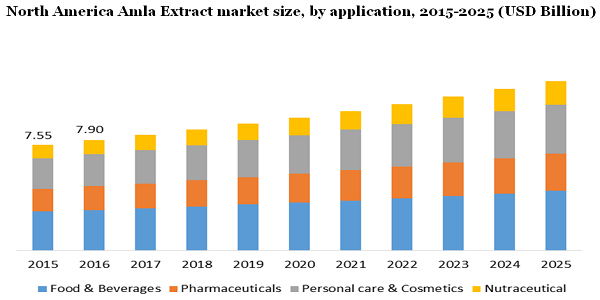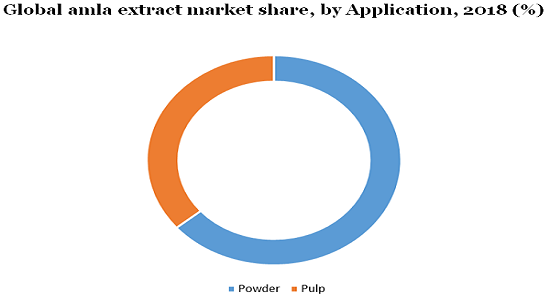- US: +1-408-610-2300
- Toll Free: +1-866-831-4085
- Become a Client
The global amla extract market size was worth USD 35.39 billion, in 2018. The market is estimated to grow at a CAGR of 4.9% over the forecast years, 2019 to 2025. Increasing health awareness and increasing demand for products that are rich in antioxidants are driving the market growth. Amla extracts help in weight loss, digestive system, and body composition improvement. Further, it reduces the multiple risks such as blood pressure, heart attack, inflammation, and cell damage. Growing awareness regarding the aforementioned benefits of amla extracts is driving the market.
Amla extracts are increasingly used in the food & beverage, cosmetics, personal care, and pharmaceuticals industry. Thus, the growing use of this product in different industries is likely to fuel market growth. Further, it has been observed in the recent past that the use of Amla is getting popular in the pharmaceutical industry, which, in turn, offers a lucrative opportunity for key players to strengthen their dominance.

Amla extracts also find their application in capsules, shampoos, hair oils, juices, and other products. The extract is rich in vitamin C and known to be beneficial for skin and hair diseases. Moreover, it is useful against diseases like cancer and provides relief against mental health. Thus, diverse applications of this product are likely to propel its demand during the forecast years.
Moreover, this extract is used in the treatment of some other diseases such as insomnia, hemorrhage, anemia, bronchitis, and asthma among others. Pharmaceutical products such as Amyron, Neeri KFT, Android, and others are known to contain amla extracts.
Among different applications, the food & beverage segment accounted for USD 12.40 billion of revenue, in 2018. Growing demand for healthy and nutritious food products is anticipated to drive the growth of this segment. Key players are focusing on expanding their product portfolios to cater to the growing demand from the consumers’ side. For instance, Patanjali Ayurved is one of the leading consumer goods companies that offer various amla-based products such as Amla Murabba, Amla Chatpata Candy, Amla Pickle, Amla Aloe-Vera, Arjun Amla Juice, Karela Amla Juice, and various other products.
The nutraceutical segment is likely to grow with the fastest growth rate and this segment is expected to show a CAGR of 5.7% during the forecast years. Rising demand for amla-based dietary supplements is expected to proliferate the amla extract market growth. Leading companies have introduced numerous amla-based supplements in various forms such as capsules, powders, and tablets.
Powder-based amla extract held the largest market share with a value of USD 22.61 billion, in 2018. The powder-based extract provides assistance against cardiovascular diseases. Further, it helps in improving glucose metabolism in skeletal muscle. Additionally, this extract is one of the purest kinds of vitamin C, which helps in improving the immune system.

On the other hand, the pulp-based extract is likely to be the fastest-growing segment over the forecast period with a CAGR of 5.2%. The pulp is widely used in the pharmaceutical and beverage industries. Key players are focusing on new product launches, which, in turn, is projected to drive market growth in the near future.
The Asia Pacific occupied the largest share in the amla extract market with nearly 30%, in 2018. The growing adoption of various amla-based products in countries such as Japan and India is attributed to the growth of this region. Further, growing awareness among consumers regarding the benefits of amla-based extracts is supplementing the market growth.
Europe is likely to be the fastest-growing region with a CAGR of 5.3% during the forecast years, 2019 to 2025. Increasing awareness regarding amla products and growing demand from the cosmetic industry is driving regional growth. Further, consumers spending in Europe has increased considerably on protein supplements, which, in turn, is positively driving the market growth.
Key players operating in the market are Patanjali Ayurveda, churches, Bhumi Amla, Ambe Phytoextracts Pvt. Ltd, Ri-Sun Bio-Tech, Sydler Group, Biomax, and Taiyo International among others. These players are focusing on new product launches, mergers & acquisitions,s and partnerships to strengthen their geographical presence. For example, Khadi Naturals introduced herbal hair powder that is aimed to work as a conditioner and cleanser.
|
Attribute |
Details |
|
The base year for estimation |
2018 |
|
Actual estimates/Historical data |
2015 - 2017 |
|
Forecast period |
2019 - 2025 |
|
Market representation |
Revenue in USD Billion & CAGR from 2019 to 2025 |
|
Regional scope |
North America, Europe, Asia Pacific, Central & South America, and Middle East & Africa |
|
Report coverage |
Revenue forecast, company share, competitive landscape, growth factors, and trends |
|
Country Scope |
U.S., Germany, UK, India, Japan, Brazil, UAE |
|
15% free customization scope (equivalent to 5 analyst working days) |
If you need specific information, which is not currently within the scope of the report, we will provide it to you as a part of the customization |
This report forecasts revenue growth at global, regional, and country levels and provides an analysis of the latest industry trends in each of the sub-segments from 2015 to 2025. For the purpose of this study, Million Insights has segmented the global amla extract market report on the basis of type, application, and region:
• Type Outlook (Revenue, USD Billion, 2015 - 2025)
• Powder
• Pulp
• Application Outlook (Revenue, USD Billion, 2015 - 2025)
• Food & Beverages
• Pharmaceuticals
• Personal Care & Cosmetics
• Nutraceuticals
• Regional Outlook (Revenue, USD Billion, 2015 - 2025)
• North America
• U.S.
• Europe
• Germany
• U.K
• The Asia Pacific
• Japan
• India
• Central & South America
• Brazil
• Middle East & Africa
• UAE


Research Support Specialist, USA